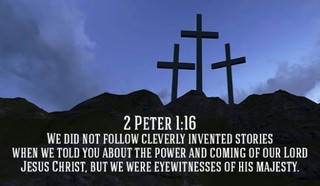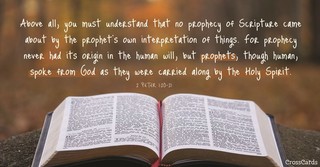- Recent Translations
- All Translations
2 Peter 1:19
Share
Settings
2 Peter 1:19 in Other Translations
2 Peter 1:19 Meaning and Commentary
Though this word of prophecy is generally understood of the writings and prophecies of the Old Testament concerning Christ, yet different ways are taken to fix the comparison: some think the sense is, that they are more sure than the cunningly devised fables, ( 2 Peter 1:16 ) but as these have no certainty nor authority in them, but are entirely to be rejected, the apostle would never put the sacred writings in comparison with them: and it is most clear, that the comparison lies between this word of prophecy, and the testimony of the apostles, who were eye and ear witnesses of the majesty and glory of Christ; but how prophecy should be a surer evidence of Christ, and the Gospel, than such a testimony, is difficult to understand; and is a sense which all agree to reject, by different methods: some think that a comparative is used for a positive, and that the meaning is, that besides the testimony of the apostles, prophecy is a very sure evidence; and this is countenanced by the Syriac version, which renders it, "and we have also a firm", or "true word of prophecy"; to which the Arabic agrees, "and we have a word of prophecy very true": others choose to retain the comparison, and which indeed ought not to be thrown out; but these are divided about it; some are of opinion that it is to be understood of the Jews to whom the apostle writes, and he himself was one, and the sense to be this; not that prophecy in itself was surer than an apostolical testimony, but that it was surer to the Jews, and more valid with them, who had been trained up in, and long used to the prophetic writings; and who had a greater esteem for the prophets of the Old Testament than for the apostles of the New; but it is scarcely credible that the apostle, who had been an eye and ear witness in the holy mount, would put himself in among them, and say, "we have" for whatever prophecy was to them, it could not be surer to him than what he had seen with his eyes, and heard with his ears. Others suppose that the meaning is, that prophecy was "now" surer to the Christians than it was "before", it being confirmed and established by facts and events, and also by miracles, and even by the attestation of this voice heard on the mount, and by the majesty of Christ seen there; but if this had been the sense of the apostle, he would have used these words, "now" and "before"; and besides, this puts the comparison quite out of its place, which manifestly stands between former prophecy, and the present testimony of the apostles: but the truth of the matter is, that this word of prophecy is not to be understood of the prophetic writings of the Old Testament; for though these are the word of God, and do testify of Christ, and are to be taken heed, and attended to, as proofs and evidence of Gospel truths, and are a light to direct and guide in matters both of faith and practice, yet they are not the only light, and are far from being the clearest, and what are only to be attended to; for the Gospel that came by Christ, and is preached by his apostles, and is contained in the writings of the New Testament, is a much clearer light, and at least equally to be attended to: nor are the prophecies of the Old Testament, which particularly relate to Christ, designed; there are many of this kind, which, put together, may very well be called the word of prophecy, and which were to the Jews a light in a dark place, until Christ came in the flesh; and though they are to be attended to, and compared with facts, to show the truth of the divine revelation, yet they are not a surer evidence, nor so sure an evidence, as the evangelical testimony is, which is of facts, and these supported by miracles; for now the dayspring from on high hath visited us, and Christ, the bright and morning star, has appeared: but the word of prophecy, concerning Christ's second coming, is here intended, whether it lies in the words of the prophets of the Old Testament, as in ( Psalms 96:13 ) ( Daniel 7:9 Daniel 7:10 Daniel 7:13 ) or in the words of Christ, ( Matthew 16:27 Matthew 16:28 ) ( Matthew 24:3 Matthew 24:30 Matthew 24:44 ) , which latter is most likely. The Ethiopic version understands this of some particular prophecy, and as if the words were a citation of some prophet, rendering the words thus, "and we have a voice more ancient than this of a prophet, saying, ye do well who take heed" Sir Isaac Newton is of opinion, that the apostle refers to the book of the Revelation of St. John, which would not be unlikely, could it be proved that it was then written. Now this prophecy or prediction, concerning Christ's coming again with power and great glory, was a surer evidence of it than what the apostles saw with their eyes, and heard with their ears upon the mount; nothing was surer to them, nor could anything make it surer to them, that he was honoured and glorified, than what they saw and heard: but then this did not so certainly prove that he would hereafter be glorified, or come again in glory. What they saw and heard was a presumptive proof that it "might" be so, and was a confirming pledge and evidence to them that so it "would" be, and was a glorious representation of it; but Christ's prophecy or prediction, that so it "should" be, more strongly ascertained it, since he said it, to whom all things were known from the beginning, and whose counsel shall stand, and not one word of his shall ever fail.
Whereunto ye do well, that ye take heed as unto a light that shineth
in a dark place, until the day dawn, and the day star arise in your
hearts.
The prophecy concerning Christ's second coming is as "as a light"; it is a revelation of that which was in the dark, lay hid as a secret and mystery in the heart of God; and which could not be known by men, had it not been foretold by God; and it is made as prophecy in all other cases is, by throwing light, as to this affair, into the mind of him, or them, to whom it is revealed; and is a light to them to whom it is delivered, and which they should attend unto, as to a lamp or torch to guide and direct them; though in some sense it is but a feeble one, and is as a light "that shineth in a dark place"; meaning not the world, which is a place of darkness, ignorance, and error; nor merely the state of the saints in general in this life, who, at most and best, see but through a glass darkly; but has a particular respect to the darkness which attends the saints, concerning the second coming of Christ, and which will especially attend them a little before that time. Prophecy holds out clearly that Christ will come again; that he will come in great glory, in his Father's, and in his own, and in the glory of his angels, and with great power, to raise the dead, and judge mankind; and though it gives hints, that, upon this, the saints shall be with Christ in the air, on earth, and in heaven; and that there will be new heavens, and a new earth; and that the saints shall reign here with Christ a thousand years, after which the Gog and Magog army will attack them without success; yet these are not so clear, as for saints to be agreed in the sense of them; and much more are they in the dark about the time of his coming. Now prophecy is the surest evidence and best light the saints have concerning this matter, "until the day dawn"; not the Gospel day, so much spoken of by the prophets, that had dawned already; rather a more clear knowledge of Christ, and Gospel truths, which will be in the spiritual kingdom and reign of Christ hereafter; or else the latter day glory, at the personal coming of Christ, when the light of the moon shall be as that of the sun, and that of the sun shall be sevenfold as the light of seven days; yea, when there will be no need of sun or moon, but Christ shall be come, and be the light of his people; see ( Isaiah 30:26 ) ( Isaiah 60:1 Isaiah 60:2 ) ( Revelation 21:23 Revelation 21:24 ) after which will follow the everlasting day of glory, when all darkness will be gone, and saints shall see face to face, and know as they are known:
and the day star arise in your hearts;
or "the sun", as the Syriac version renders it; not Christ, the morning star, the dayspring from on high, and the sun of righteousness, who was already risen upon them; nor the grace of God implanted in their hearts, by which they were already called out of darkness, and made light in the Lord; but as the day star is the bringer of light, as the word used signifies, or the forerunner of the day, so it here intends the immediate signs and forerunners of the coming of Christ; which when observed in their hearts, and by their understandings, as being come to pass, they may lift up their heads with joy, because their redemption draws near, ( Luke 21:28 ) and so the Ethiopic here renders it, "and redemption, arise for you in your hearts". Now till this time the sure word of prophecy concerning Christ's second coming is to be "taken heed unto", as a lamp, light, and torch, to direct us to it, to encourage us to love it, long for it, and hasten to it: and in so doing we shall "do well"; it will be well for the glory of God and Christ, this being setting our seals to them as true; and well for ourselves to keep up our faith, hope, and expectation of it, unmoved.



